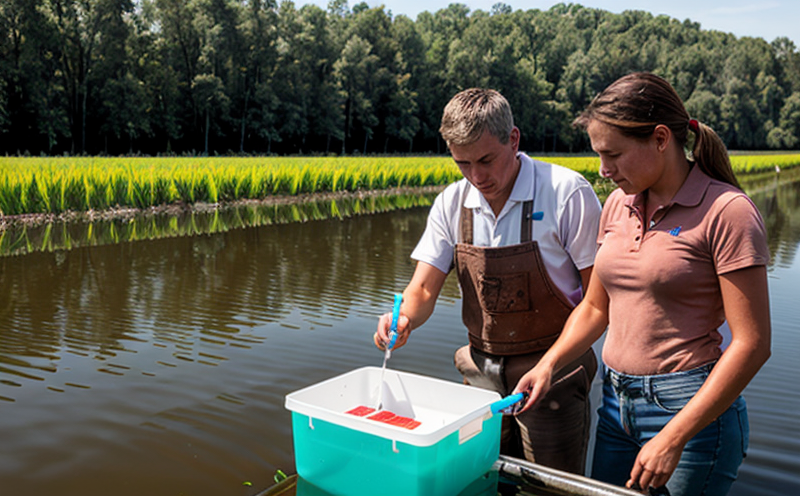Water Suitability Index for Irrigation Testing
The Water Suitability Index (WSI) is a critical parameter that agricultural and forestry sectors use to determine whether irrigation water meets the necessary quality standards for crop growth and tree health. The WSI accounts for various chemical, physical, and biological parameters that directly influence plant physiology, ensuring optimal conditions for sustainable agriculture.
Water quality plays a pivotal role in agricultural productivity and environmental sustainability. Poor-quality irrigation water can lead to soil degradation, reduced yields, and increased risks of crop diseases or even plant death. The WSI provides a comprehensive evaluation framework that helps stakeholders make informed decisions about the suitability of irrigation water for specific crops.
The testing process involves multiple steps, including sample collection, preliminary screening, and detailed analysis using advanced laboratory techniques. Samples are analyzed to determine parameters such as pH, electrical conductivity (EC), salinity levels, nutrient content, heavy metals, pesticides, and pathogen presence. Each parameter is assessed against established standards like ISO 6586:1973 for EC measurement or ASTM D3259-07 for pesticide residue analysis.
For instance, crops with high salt tolerance may be suitable for irrigation water with higher salinity levels than those intolerant to such conditions. Similarly, different crops have varying nutrient requirements, which the WSI helps identify. By tailoring irrigation practices according to these parameters, farmers can maximize crop yields while minimizing environmental impacts.
The testing process begins with sample collection from various sources, including wells, rivers, and reservoirs. Samples are then preserved using appropriate methods to prevent degradation or contamination before being transported to the laboratory for analysis. Once received, samples undergo a series of tests designed to assess their suitability for irrigation purposes.
During testing, it is crucial to follow strict quality control measures to ensure accurate results. This includes calibrating instruments regularly and maintaining controlled environmental conditions during sample preparation. The use of certified reference materials (CRMs) helps validate test methods and ensures consistency across different batches or laboratories.
- Calibration of instruments
- Maintenance of controlled environments
- Use of CRMs for validation
Why It Matters
The importance of water quality in agriculture cannot be overstated. Poor-quality irrigation water can lead to significant economic losses due to reduced crop yields, increased input costs, and potential damage to soil structure. Additionally, improper use of irrigation water can have adverse environmental effects, contributing to water pollution or exacerbating existing issues like salinization.
By using the Water Suitability Index for Irrigation Testing, stakeholders can make data-driven decisions that promote sustainable farming practices. This approach not only enhances agricultural productivity but also ensures compliance with regulatory standards and promotes responsible resource management.
The WSI is particularly relevant in regions facing water scarcity or where irrigation water sources are prone to contamination from pollutants like fertilizers, pesticides, or industrial waste. In such cases, the index provides valuable insights into the potential risks associated with using particular water sources for irrigation.
Furthermore, the WSI supports environmental sustainability by encouraging the use of alternative water resources that minimize pressure on freshwater ecosystems. This can include rainwater harvesting, recycled wastewater, or brackish water treatment projects when appropriate.
Eurolab Advantages
At Eurolab, our commitment to excellence in agricultural and forestry testing ensures that we provide reliable, accurate, and timely results for the Water Suitability Index. Our team of experts leverages advanced laboratory equipment and state-of-the-art methodologies to conduct thorough analyses.
We offer a range of services tailored to meet the specific needs of our clients, whether they are farmers seeking to optimize irrigation practices or researchers investigating new crop varieties. Our multidisciplinary approach allows us to provide comprehensive assessments that consider all relevant factors affecting water quality and its suitability for agriculture.
Our facilities comply with international standards such as ISO/IEC 17025, ensuring the highest level of accuracy and reliability in our test results. This accreditation guarantees that our findings are consistent and comparable globally, supporting informed decision-making processes across various sectors.
We also prioritize client satisfaction by offering personalized service packages designed to fit individual project requirements. From initial consultation through final report delivery, we ensure seamless communication throughout the testing process, providing clear explanations of our methodologies and results.
Quality and Reliability Assurance
To ensure the reliability and accuracy of our results, Eurolab employs rigorous quality control measures throughout every stage of the testing process. These include regular calibration of instruments, maintenance of controlled environmental conditions during sample preparation, and the use of certified reference materials (CRMs) for validation.
- Regular instrument calibration
- Maintenance of controlled environments
- Use of CRMs for validation





